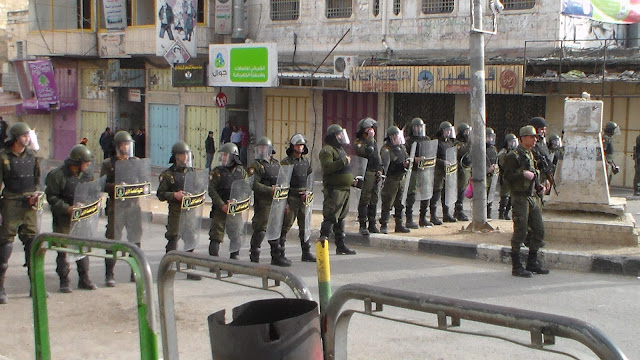On Wednesday, February
19th, 2013, Michigan Peace Team joined Rabbi for Human Rights on a
visit to speak with Mayor Abdel Adim of Qasra.
Qasra is a Palestinian village which suffers greatly from Israeli
military and settler violence and oppression.
MPT and RHR visited Mayor Adim to inquire about some recently planted
olive trees in the village.
During the visit,
Mayor Adim received an alarming call from a fellow villager who reported that Israeli Defense Forces had entered the village with a bulldozer. MPT and RHR accompanied the mayor to the
southeastern side of the village where the soldiers guarded a bulldozer as it
demolished Qasra’s power lines.
Israeli border guards
began pushing at MPT, RHR, and a crowd of local villagers that had
gathered. When questioned, the soldiers
were unwilling to give any explanations or provide any written orders for the
demolition at hand.
As the crowd grew
larger, and as aggravation and sorrow escalated, soldiers began firing tear gas in an attempt to disperse the crowd. Several Palestinians were injured and taken
away in ambulance vehicles. It is reported that one man who was injured was denied by occupation forces access to be removed from the scene to receive medical attention. The vehicle attempting to remove the injured man had tear gas canisters fired at it.
Despite Palestinian
objection, and the Israel military's failure to provide demolition orders, Israeli forces
destroyed part of the electricity network and demolished 36 electricity towers
in total on Wednesday.
In the days following
this demolition, Qasra villagers have continued to suffer greatly from both
nearby Israeli settlers and the Israeli soldiers.
Settler attacks and Israeli army invasions have continued to escalate
dramatically.
On Thursday, February
20th, settlers invaded the village in the middle of the night,
burning six cars belonging to Qasra residents.
On Saturday, February
23, 2013, Qasra residents suffered the joint attacks launched by Israeli forces
and settlers. In these attacks, 8
Palestinian civilians were injured, including 3 children.
The Palestinian Centre
for Human Rights (PCHR) reports that:
“PCHR condemns the
escalation of attacks by Israeli forces and settlers against Qasra village,
southeast of Nublus. In this context,
PCHR:
1.
Reminds the international
community that the building of settlements constitutes a war crime under
international law; the High Contracting
Parties to the Fourth Geneva Convention, individually or jointly, must assume
their legal and moral responsibilities and fulfill their obligation to ensure
Israel’s respect for the Convention in the occupied Palestinian territory in
accordance with Article (1) of the Convention;
2.
Calls upon the international community to pressurize Israel to
fulfill its obligations under the international law by putting an end to
settlement expansion and dismantling all illegal settlements in the occupied
Palestinian territory.

















































.jpg)



